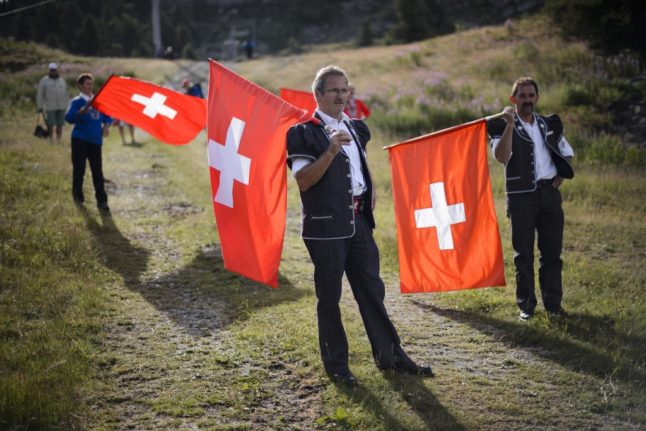Swiss Germans are incredibly proud of their wide variety of dialects, known as Schwyzerdütsch.
But it’s fair to say that these dialects are not well known outside of Switzerland. In fact, even some High German speakers struggle with understanding Swiss German.
But according to a report in Swiss newspaper Blick, there is a famous word used in other languages that actually originated from Swiss German.
And no, it isn’t Müesli, which is probably the most famous Swiss German export.
READ ALSO: Swiss German vs Hochdeutsch: What are the key differences?
The word is ‘putsch’, which many people around the world use in a political context to mean a coup, or an attempt to overthrow a government.
According to the report, ‘putsch’ originated from the Zurich dialect of the 19th century.
‘Züriputsch’
At that time in Zurich, putsch meant knock, thrust, clash, bang or push.
This type of clash happened in Zurich’s Paradeplatz on September 6th 1839. It involved thousands of members of the rural conservative population who stormed against the liberal rule of the city of Zurich.
The insurgents saw the position of the church threatened, feared for their traditions and felt abandoned by the government and townspeople.
The putsch, which was led by Pastor Bernhard Hirzel, cost the lives of 14 insurgents and a member of the government council. The Zurich government abdicated, and the rebels celebrated this as a success. In the long run, however, the uprising had no effect.

The events received a lot of attention abroad. German newspapers reported on the ‘Züriputsch’. In France and Britain, reports spoke of “le putsch” or “the putsch” in Switzerland.
In the decades after 1839, the term gained popularity. According to the Merriam Webster dictionary, it became even more well known in English around the Kapp Putsch of 1920, when Wolfgang Kapp and his right-wing supporters attempted to overthrow the German Weimar government.
Putsch attempts were common in Weimar Germany, so the word appeared often in the stories of British journalists who described the events
Adolf Hitler’s attempt to gain power with the National Socialists in the Bürgerbräukeller in Munich on November 9th 1923 went down in history as the “Hitler Putsch” or “Beer Hall Putsch”. These events helped the Swiss German word achieve a global breakthrough.
READ ALSO: Why November 9th is a fateful day in German history
In 1958 and 1961, when sections of the French military campaigned for Algeria to remain part of France, they revolted against the government in Paris. The resistance failed both times and the North African country became independent in 1962. The events found their way into the French history books as the “putsch d’Alger” and the “putsch des généraux”.
In recent history, former US President Donald Trump’s supporters tried to enact a putsch in Washington DC in January 2021. In neighbouring Germany, a group of far-right extremists were arrested in a suspected plot to overthrow the government in December 2022. And in June this year, the leader of the Russian Wagner Group, Yevgeny Prigozhin, failed in a revolt against the Russian government.
So if this word is part of your vocabulary then congratulations – you already speak (a little) Schwyzerdütsch.



 Please whitelist us to continue reading.
Please whitelist us to continue reading.
Member comments